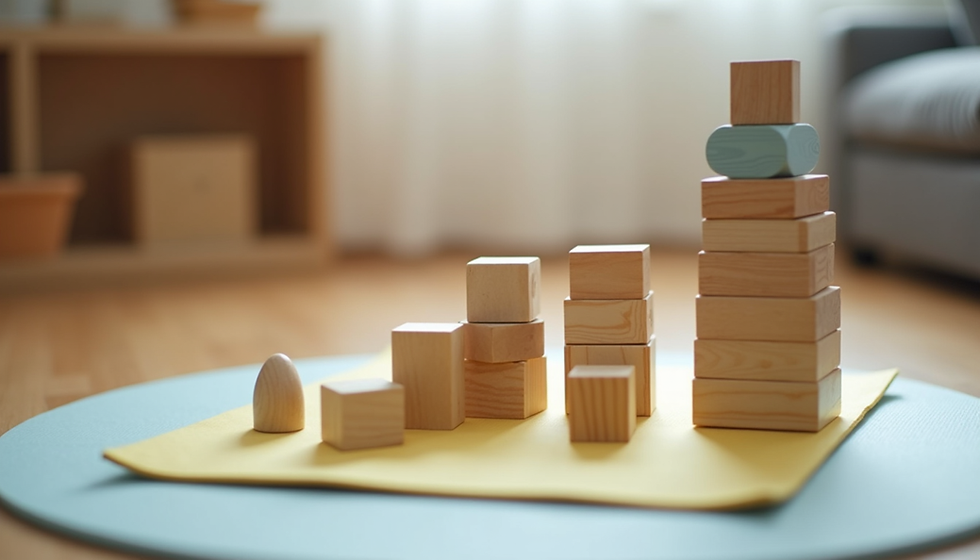How Montessori Toys Encourage Independent Learning in Kids
- G MANASA
- Jun 9, 2025
- 4 min read
Montessori toys are more than just playthings; they are designed to inspire creativity, independence, and learning in young minds. Developed by Dr. Maria Montessori, this educational philosophy encourages children to explore and learn at their own pace. In this blog post, we will discuss how Montessori toys promote independent learning in kids and provide insights into choosing the right toys for your child’s developmental needs.
Montessori Toys: A Gateway to Learning
Montessori toys are specifically designed to cater to children's innate curiosity. By allowing kids to explore concepts through hands-on activities, these toys foster a deep understanding of the world around them. A well-crafted Montessori toy not only entertains but also teaches essential life skills, such as problem-solving, critical thinking, and autonomy.
For instance, stacking blocks can help children grasp basic mathematical concepts, such as counting and geometry, while also enhancing their fine motor skills. The beauty of Montessori toys lies in their simplicity and versatility. They often have a single purpose, allowing children to focus on one aspect of play without distractions.

Benefits of Montessori Toys in Independent Learning
Montessori toys encourage independent learning in several ways:
Encouragement of Self-Directed Learning
One of the core principles of Montessori education is self-directed learning. Montessori toys allow children to choose activities that interest them, thereby promoting engagement and exploration. When kids select their toys, they take ownership of their learning experiences, which fosters independence.
Enhanced Problem-Solving Skills
When children play with Montessori toys, they often face challenges that require creative solutions. For example, a puzzle may present a difficulty that children must navigate to complete the task. This trial-and-error process builds confidence in their problem-solving abilities and encourages them to think independently.

Development of Fine Motor Skills
Montessori toys often require manipulation, such as stacking, sorting, or fitting pieces together. These activities enhance fine motor skills, which are crucial for tasks like writing and self-care. As children engage with these toys, they learn to control their movements and develop dexterity, which are vital for their independence.
Promotion of Concentration and Focus
Montessori toys’s design naturally captivates children's attention, allowing them to immerse themselves in activities. Activities that require concentration teach children to focus their minds, leading to longer attention spans. This skill not only aids in learning but also helps children become more independent in managing their time and tasks.
Selecting the Right Montessori Toys
When choosing toys for your child, consider the following tips to ensure they align with the Montessori philosophy:
Age Appropriateness
Choose toys that correspond to your child's developmental stage. Younger children may benefit from simpler toys like building blocks, while older kids may enjoy more complex puzzles or science kits. Look for toys that challenge them without causing frustration.
Quality over Quantity
Invest in high-quality, durable toys made from sustainable materials. These toys tend to be more engaging and last longer. They can withstand everyday use while providing a safe and enriching play experience.
Open-Ended Play
Select toys that promote open-ended play, allowing children to use their imagination. Open-ended toys can be used in multiple ways, fostering creativity. For example, a set of wooden blocks can turn into a castle or a car, depending on the child's imagination.
Balance Between Structure and Freedom
While Montessori toys promote independent learning, it is also important to provide some structure. Create a designated play area that encourages exploration but also gives guidance. This balance helps children feel supported while they learn to make choices independently.
Integrating Montessori Toys into Daily Life
Incorporating Montessori toys into your child’s daily routine can enhance their learning environment. Here’s how you can seamlessly introduce these tools into their lives:
Create a Dedicated Play Space
Designate an area in your home specifically for play. Keep it organized and filled with various Montessori toys that encourage independent exploration. A clutter-free environment allows children to focus on their activities without distractions.
Encourage Playtime Choices
Allow your child to choose which Montessori toys they want to play with each day. This freedom of choice enables them to explore their interests and engage with activities that excite them. It also fosters independence and self-confidence.
Participate and Observe
Engage with your child during playtime without taking over. You can provide guidance, ask open-ended questions, or simply observe. This approach allows them to explore independently while knowing you are available if needed.
Mix Learning with Daily Activities
Incorporate Montessori principles into everyday tasks. For instance, you can involve your child in cooking, allowing them to measure ingredients, further promoting their problem-solving skills and independence. This way, learning becomes a natural part of life, not just limited to playtime.

Long-Term Benefits of Independent Learning through Montessori Toys
The skills learned through independent play with Montessori toys have long-lasting effects. Children who engage in self-directed learning are often more adaptive, resilient, and prepared for future academic challenges. They develop critical thinking and the ability to work independently, which are skills highly valued in education and the workforce.
Parents often notice that children who regularly play with Montessori toys exhibit greater self-esteem and confidence when attempting new activities. The foundation laid through these toys can shape their attitudes toward learning for years to come.
Final Thoughts
Montessori toys play a vital role in encouraging independent learning in children. By fostering curiosity, problem-solving skills, and confidence, these toys create a nurturing learning environment. As parents and educators, it is essential to choose quality Montessori toys that promote exploration and self-directed learning.
For a wide selection of montessori educational toys, consider exploring options that cater to your child’s interests and developmental needs. Invest in their growth today and watch them flourish into independent learners. By integrating Montessori principles into your child's life, you're not only enhancing their learning experience but also setting them up for a successful future.



Comments